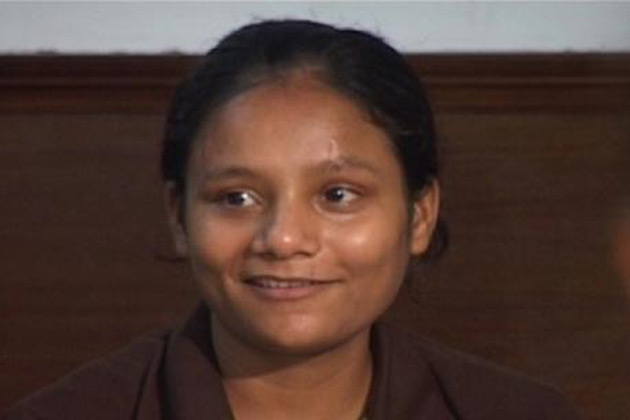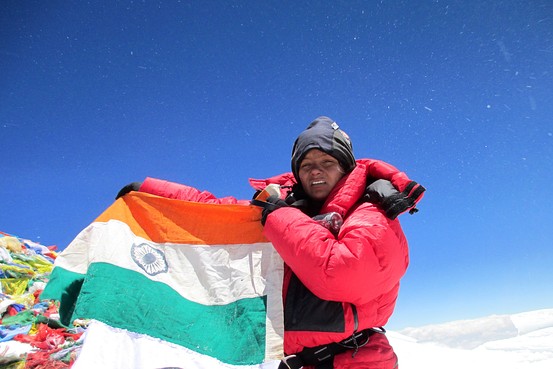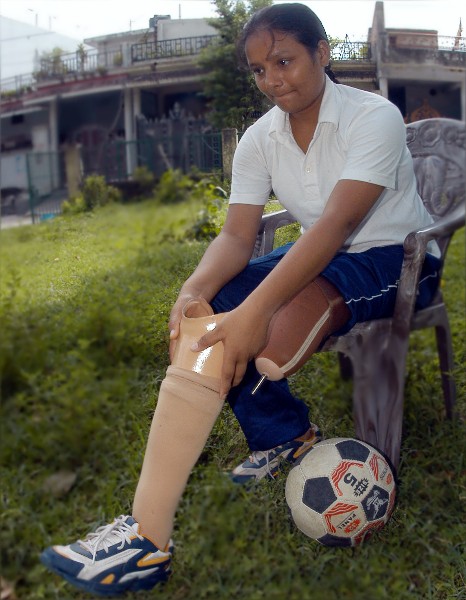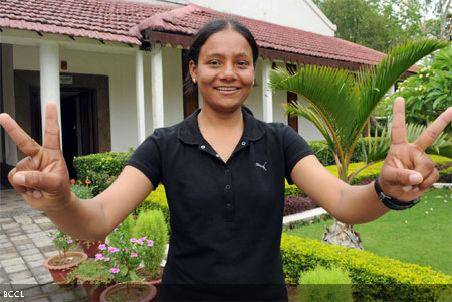Arunima Sinha
Arunima Sinha
First woman amputee to scale Everest
- AVM & Subbu
 Climbing Mount Everest is one of the hardest things any human can do. But climbing it with an artificial leg? That's what Arunima Sinha did in May 2013, becoming the first woman amputee to scale the mountain, in a climb of 52 days.
Climbing Mount Everest is one of the hardest things any human can do. But climbing it with an artificial leg? That's what Arunima Sinha did in May 2013, becoming the first woman amputee to scale the mountain, in a climb of 52 days.
A former national level volleyball player Arunima Sinha, a resident of Ambedkar Nagar in Uttar Pradesh, was pushed out of the general compartment of Padmawati Express for resisting a chain-snatching attempt by some criminals, while travelling from Lucknow to Delhi on April 12, 2011 describes it as her “darkest hour”.
She was hit by a passing train and was seriously injured. Ms Sinha was admitted to hospital with serious leg and pelvic injuries. Doctors had to amputate her left leg below the knee to save her life. A rod had to be inserted inside her leg to provide support to the damaged limb.
"I was shattered. Here was someone who was totally independent, and now I was dependent on others for support. Visitors who came to see me at the hospital showed sympathy. But then I decided to do something that would inspire others."
She says her family's support gave her immense confidence. "I decided to challenge myself with the toughest sport. And I chased my dream with passion."
 "Cricketer Yuvraj singh has been an inspiration for me. If a person can fight cancer and come back and perform in the field then why can't I do something similar," she told reporters. "When he came back from the US, I had come to Gurgaon to meet him and when in hospital I had spoken to him on the phone."
"Cricketer Yuvraj singh has been an inspiration for me. If a person can fight cancer and come back and perform in the field then why can't I do something similar," she told reporters. "When he came back from the US, I had come to Gurgaon to meet him and when in hospital I had spoken to him on the phone."
Equipped with a prosthetic leg and an iron will, Ms Sinha rang up Bachendri Pal, the first Indian woman to scale Mount Everest in 1984, as soon as the hospital discharged her four months later. She had read about Pal but did not know her personally. Pal heads an adventure foundation, supported by India's Tata Steel Company, in the city of Jamshedpur in the eastern state of Jharkhand. Sinha underwent a year of rigorous training in Uttarkashi in the northern state of Uttarakhand which demanded toughness - both physical and mental.
"I felt low when I couldn't catch up with other 'normal' able-bodied people. But I was determined to outpace them. And I did," she says.
 It took her 52 days of torturous climbing on the snowy peaks to conquer the 8,850m (29,000 ft) summit. At one point, fearing that her energy and oxygen levels were depleting fast, her team leader suggested that she return. But she refused.
It took her 52 days of torturous climbing on the snowy peaks to conquer the 8,850m (29,000 ft) summit. At one point, fearing that her energy and oxygen levels were depleting fast, her team leader suggested that she return. But she refused.
While descending, she began to sweat so profusely that at one point she felt the prosthetic leg would slip out. "I couldn't take off my gloves to support the leg for fear of frostbite, so I dragged myself till the camp," she says.
While going up we didn't face so much problems but coming down caused a lot problems because my prosthetic leg would slip off due to sweat and some blood. I had suffered blisters on my leg and had to drag my feet for sometime till I reached a safe place to open my wound.
Her achievement comes 15 years after the first male amputee made it to the top of Everest. Tom Whittaker from the U.K., who lost his foot in a car accident, reached the summit in May 1998.
There are inspiring words from an extraordinary woman. Also, a stunning demonstration of how she turned her supposed weakness into a winning force.
"When I reached the summit, I felt like screaming at the top of my voice. I wanted to tell the world: here I am. I have saved that moment inside me," she says.
 "Actually, my screaming did not last long. You see, I didn't have much energy left. Had I been a painter, I would have tried to capture that image on a canvas," she adds.
"Actually, my screaming did not last long. You see, I didn't have much energy left. Had I been a painter, I would have tried to capture that image on a canvas," she adds.
Ms Sinha has dedicated her achievement "to those who lose hope". She is now busy with plans to open a sports academy for the poor and physically challenged children. For this purpose, she has already bought a piece of land in Unnao district in Uttar Pradesh. "I want to train these children so that they achieve their dream. This is my dream too," she says.
India is not a disabled-friendly country; even the big cities have hardly any wheelchair ramps, let alone easy-access train stations. "I turned my artificial leg into my strength," says Ms Sinha. In the process, she's provided an object lesson in what strength is.
****************




